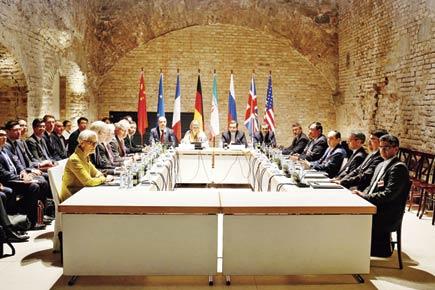The deal is done but there are intricacies, pitfalls, and interpretations that experts will keep talking about

 The deal is done but there are intricacies, pitfalls, and interpretations that experts will keep talking about. Writing in my mid-day column in March 2013 (‘Could Iran be Obama’s Legacy’), I had ended by saying that “If Richard Nixon sought a breakthrough in China after failure in Vietnam, George Bush had a breakthrough with India after failure in Iraq, Barack Obama could work on a legacy that is a breakthrough with Iran after failure in Afghanistan without having to give up close US bonds with Israel.” Legacy or not, there is no doubt that this deal will change equations, and renew ambitions, fears and opportunities in the region.
The deal is done but there are intricacies, pitfalls, and interpretations that experts will keep talking about. Writing in my mid-day column in March 2013 (‘Could Iran be Obama’s Legacy’), I had ended by saying that “If Richard Nixon sought a breakthrough in China after failure in Vietnam, George Bush had a breakthrough with India after failure in Iraq, Barack Obama could work on a legacy that is a breakthrough with Iran after failure in Afghanistan without having to give up close US bonds with Israel.” Legacy or not, there is no doubt that this deal will change equations, and renew ambitions, fears and opportunities in the region.
ADVERTISEMENT

Representatives of Iran and six major powers meet in Vienna, Austria in April 2015, seeking to finalise the historic deal curbing Iran’s nuclear programme, finally inked on July 14. Pic/AFP
No sooner had the ink dried on the July 14 Vienna Agreement that the French announced their Foreign Minister would be visiting Iran soon to discuss business deals. This is really an indication of the importance of Iran to the West, especially Europe held at bay for so long by US policies. India has not even begun while others have already stepped in.
Our vote against Iran at the IAEA in 2009 had become an impediment and we followed this by being hustled into reducing our Iranian oil purchases. Iran, with potentially the second largest reserves in gas and oil, is no pushover. We need to revive our interest in FarzadB oilfields and gas projects; as also the railway projects. The Iranian media also spoke about Indian assistance for building an aluminum smelter plant. Our much vaunted Chahbahar route must rapidly get off the drawing board on to the ground.
Prime Minister Modi’s revival of the decades-old suggestion, while on a visit to Turkmenistan ahead of the Iran deal, is interesting. He pitched for an Iran-Oman-India undersea pipeline which would also carry Turkmen gas. Parviz Aghili, founder of Middle East Bank was in India recently to meet industrialists for possible deals. This is the kind of line we need to pursue urgently, as China and western corporate giants begin to line up for business in Iran. Even American companies would like to do business in Iran. Competition will increase with time and it makes good sense to pitch in early.
Chinese and Russians already have an effective presence in Iran. With China getting increasingly involved in Afghanistan, it would seem that China now has an additional route to Iran and the Persian Gulf apart from the Turkmenistan route. US would not want to leave the field open and uncontested to these two in this vital area.
The US Defence Secretary visited Israel and Saudi Arabia to reassure them of continued US support. It is not yet certain if this apparent turnabout by the US on Iran after decades of hostility is going to be accepted easily by these two long-term allies of the US.
Israeli misgivings about this deal are well known. Oded Eran of INSS asserts that Israel must accept the reality of the July 14 Vienna Agreement. However, the debate in the US especially in the Congress has just begun and Israel could influence these as well as those between US and Iran while staying away from the political divide in election year in the US. Israelis believe the Vienna Agreement may not be the last word as far as the
US is concerned, but the world will have moved on as the sanctions get lifted gradually and the billions start to flow in.
The Saudis would be considerably alarmed at the further rise in importance of their arch-rival Iran in the region now a quagmire of conflicting interests. As it is, they have serious domestic security issues as the ISIS begins to get active even in Saudi Arabia and the Gulf. ISIS and Al Qaeda have been battling for turf in the region where ISIS may be winning the sprints but may not last out the long distance. Afraid of being caught in a pincer of Shia resurgence and ultra-radicalism of the Sunnis, Saudi Arabia and the Gulf Emirates are beginning to do a deal with Al Qaeda against ISIS, as the moderate option, if you please. Meanwhile, a Pakistani Urdu paper Roznama helpfully suggested that Saudi Arabia should also acquire nuclear technology to counter Iran’s “expansionist designs.”
For India, the evolving situation is a challenge and an opportunity to bypass Pakistan to gain access to Central Asia. We will have to be consistent, quick-footed and have the stamina for the long race.
The writer is a former chief of Research and Analysis Wing (RAW)
 Subscribe today by clicking the link and stay updated with the latest news!" Click here!
Subscribe today by clicking the link and stay updated with the latest news!" Click here!







